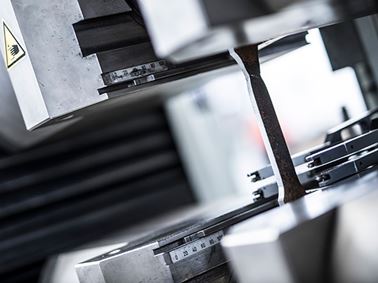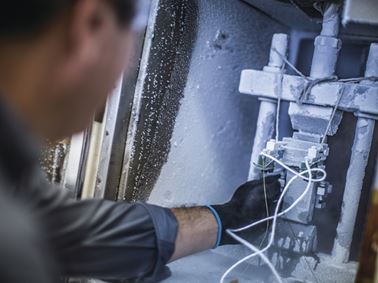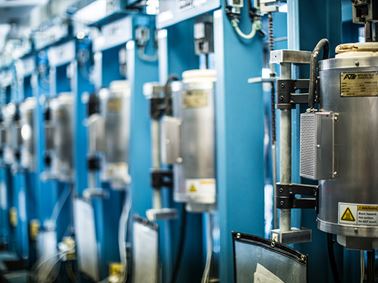Evaluate the strength, stiffness, and ductility of your materials to minimize real-world failures. Element’s tensile testing services ensure the reliability, quality, and performance of your materials to comply with industry standards and regulatory requirements.
What is tensile testing and why do you need it?
Tensile testing helps ensure your product or material is fit for purpose and won’t fail structurally. It is a destructive mechanical testing method, which stretches or pulls your sample in a single direction until it breaks, to establish the maximum stress the material can cope with. Once you know this, you can make more informed decisions about the design of your product that balances performance and economy alongside safety and durability.
Key Benefits of Partnering with Element for Tensile Testing Services
- Fast and precise test results: Working with us gives you quick access to data from our extensive global network of laboratories. This not only ensures the safety, quality, and compliance of your materials but also provides you with the confidence that they are purpose-fit and ready to perform at their best.
- Access our global network: Gain more than just test results; access our expansive global network for comprehensive material insights. Our laboratories are located worldwide, allowing you to benefit from a wealth of expertise, diverse testing capabilities, and a global perspective to ensure suitability across different applications.
- Cutting-edge instrumentation for advanced insights: The advanced tools at our laboratories can help you measure complex material properties, including ultimate tensile strength (UTS), maximum elongation (E), and reduction of the area of a material (RA). Whether you want to understand characteristics such as Young's modulus, Poisson's ratio, yield strength, elongation, or strain-hardening properties, our technology can provide insights.
- Better understand your materials: We apply static or slowly applied forces to determine ultimate tensile strength, providing crucial insights into the strength, stiffness, and ductility of both metallic and non-metallic materials. Our industry-leading approach ensures you receive unmatched information about your materials' fundamental properties.
- Certifications to international standards: We are committed to ensuring your testing and certification exceed industry standards for Safety and Quality Assurance, instilling confidence in your materials' safety, quality, and compliance. We strictly adhere to recognized international standards for metals, composites, polymers, rubber, elastomers, and welds - such as ASTM, ISO, AWS, EN, BSI, DIN, and DNV.
- Specialized composite and polymer testing: Our experts are equipped to handle specialized composite and polymer testing, meeting standards such as ASTM D3039, ASTM D638, ASTM D882, and more. Trust our rigorous testing processes for insights into the characteristics and suitability of your composite and polymer materials.
- Risk mitigation: Our tensile testing services provide valuable data to assess the structural performance of materials under stressful conditions. Identify and mitigate risks associated with material failure to avoid product failures, accidents, and financial losses.
Your Tensile Testing Experts


Cutting-edge Instrumentation for Advanced Insights
The advanced tools at our laboratories can help you measure complex material properties, including ultimate tensile strength (UTS), maximum elongation (E), and reduction of the area of a material (RA). Whether you want to understand characteristics such as Young's modulus, Poisson's ratio, yield strength, elongation, or strain-hardening properties, our technology can provide insights.
End-to-end Solutions for Your Unique Material and Industry Challenges
Whether you're in aerospace, medical devices, or manufacturing, our labs are dedicated to addressing your unique challenges. We provide a broad spectrum of materials testing services tailored to your industry's specific needs. Beyond standard tensile testing, our offerings encompass a variety of mechanical tests, including fatigue, compression, cryogenics, and more. As your end-to-end solution, we meet the diverse demands of different materials and industries with precision and expertise.
Tensile Testing Services
Tensile testing of metals
Whether you are a manufacturer of metal products, a designer, or a quality manager, materials testing is a valuable approach to ensuring that the materials you are developing or incorporating into infrastructure and products are of high quality and can perform over their expected lifespan. We provide tensile testing for metals and metallic alloys according to common industry standards, including ASTM E8, ASTM E21, BS EN 2002, ISO 898-1, and ISO 6892.
ASTM composite tensile test
Testing composites requires specialized knowledge, experience, and equipment. Our composite experts are well-versed in various composite tensile test specifications, including ASTM D3039, ASTM C363, ASTM C1273, ASTM C1359, and ASTM D7565. With active memberships in numerous composite committees such as ASTM D30, CMH-17, Nadcap, and the Committee on Composite Materials, our composite testing labs can help you unlock the full potential of your advanced materials.
ASTM polymer tensile test
Polymers and plastics possess a high degree of stiffness and strength, without the added weight of traditional materials like metals and plastics. We offer tensile testing for polymers and polymer matrix composites according to ASTM D638, ASTM D882, ASTM D1004, ISO 527, and more.
Rubber and elastomer tensile test
Tensile testing of rubber and elastomers measures the elasticity of the material while under tensile strain, and the behavior of the material after testing. Our experts test rubber and elastomer materials according to specifications including ASTM D412, ASTM D414, and ISO 37.
Weld tensile testing
We offer testing services for different types of welds. Whether it’s tensile tests per ASME Section IX, AWS D17.1, DNV F101, or ISO 4136, you can rely on our certified weld technology experts and PCN and CSWIP-qualified weld inspectors for critical welding-related services. From welds to transverse welds, our testing determines resilience and resistance, ensuring your welds meet the highest standards.
Additional tensile testing capabilities
- Axial tensile testing
- Cryogenic testing
- Custom tensile testing
- Digital image correlation
- Ductility testing
- Elevated, reduced, or ambient Temperature
- Elongation testing
- Fastener testing
- Flexural tensile testing
- High strain rate tensile testing
- High-Force Testing
- Medical device testing
- Open hole compression & tensile testing of composites
- Pipe tensile testing
- Pull-off strength
- Rebar and tubular product testing
- Ring testing
- Room temperature tensile
- Slow strain rate tensile testing
- Tensile adhesion strength
- Tensile resistance
- Tensile testing of porous coatings
- Thorough-thickness testing
- True stress and strain measurements
Why Choose Element?
At Element, we adhere to a broad spectrum of international standards, providing certification that instills confidence in the safety, quality, and compliance of tested materials. Our ISO 17025 and NADCAP-accredited tensile testing laboratories in the US, Europe, the Middle East, and Asia use cutting-edge testing technology for accurate and reliable results.
From metals to polymers, our dedicated experts bring unmatched knowledge and experience to ensure precise tensile tests for a wide range of materials. You'll receive test results with unmatched levels of accuracy, quality, and clarity - plus, you'll have direct access to top engineering experts for technical guidance.
To learn more about Element’s credentials, please visit our About Us page. To discuss how we can support your ultrasonic testing and inspection needs, contact our experts today.
Tensile Testing of Metal Products
ASTM E8/E8M describes the methods of determination of mechanical properties that define the quality of a material: yield strength, yield point elongation, tensile strength, elongation, and reduction of area. Download a free guide to understanding the test procedure, the test specimens, and the test data. READ MOREASTM D3039 Testing Considerations
Although it is a popular composite tensile testing method, there are a few considerations that must be made prior to performing ASTM D3039 testing. Read our article to learn more about 5 considerations for ASTM D3039 composite tensile testing.
READ MOREGripping Medical Devices for Tensile Testing
Medical devices such as leads and sutures are typically subject to tensile testing to characterize their mechanical properties under tension. Gripping these devices during testing provides additional challenges and can require custom fixturing to obtain meaningful data. READ MORERelated services

Tensile Testing of Composites
Tensile testing of composites to ASTM D3039 determines the ultimate tensile strength, ultimate tensile strain, tensile chord modulus of elasticity and Poisson’s ratio of Polymer Matrix Composites (PMCs).

Open Hole Compression & Tensile Testing
Element’s composite testing experts perform open hole compression and open hole tensile testing to provide critical data points for your material and to ensure it is fit for purpose.

Mechanical Testing at Cryogenic Temperatures
Element’s cryogenic testing services ensure the reliability and optimum performance of your materials in low-temperature conditions.

Materials Testing for Nonmetals
We make it simpler for you to evaluate characteristics, select materials, comply with industry standards, and develop higher-quality products. We offer trustworthy data for composites, polymers, rubber and elastomers, adhesives, foam, paint and coatings, textiles, and more.

Porous Coating Testing
Our porous coating testing is beneficial in satisfying FDA or other regulatory body requirements, helping with research and development of new coating processes and technologies, and providing insight to compare or validate coating suppliers.

Aerospace Mechanical Testing
Find out about Element's tensile, elongation, compression, impact, fracture toughness, stress, rupture, fatigue, hardness, abrasion & wear, bend, pressure, shear and torque testing services.

